 W
WThe Communist Party of Australia (CPA) was founded in 1920 and dissolved in 1991. The CPA achieved its greatest political strength in the 1940s and faced an attempted ban in 1951. Though it never presented a major challenge to the established order in Australia, it did have a (relatively) large membership and a significant influence on the trade unions, social movements, and the national culture.
 W
WThe Brazilian Communist Party, originally Communist Party of Brazil, is a political party in Brazil founded in 1922 which makes the disputed claim of being the oldest political party still active in the nation. It played an important role in the country's 20th-century history despite the relatively small number of members. A factional dispute led to the formation of PCdoB in the 1960s, though both communist parties were united in opposition to the Brazilian military government that ruled from 1964 to 1985. But with the fall of the Soviet Union and the collapse of communism circa 1990, the party lost power and international support. An internal coup in 1992 divided the party and formed a new party, called Socialist People's Party, using the former identification number of the PCB, 23. This party has since moved towards the centre and now goes by the name Cidadania.
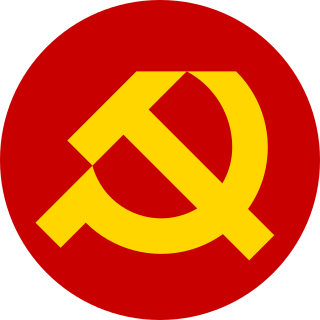 W
WThe Bulgarian Communist Party was the Communist and Marxist-Leninist ruling party of the People's Republic of Bulgaria from 1946 until 1989 when the country ceased to be a socialist state. The Bulgarian Communist Party had dominated the Fatherland Front coalition that took power in 1944, late in World War II, after it led a coup against Bulgaria's tsarist regime in conjunction with the Red Army's crossing the border. It controlled its armed forces, the Bulgarian People's Army.
 W
WThe Colombian Communist Party or PCC is a legal communist party in Colombia. It was founded in 1930 as the Communist Party of Colombia, at which point it was the Colombian section of the Comintern, and changed its name in 1991. The party is currently led by Jaime Caycedo and publishes a weekly newspaper called Voz.
 W
WThe Communist Party of Denmark is a communist political party in Denmark. DKP was founded on 9 November 1919 as the Left-Socialist Party of Denmark through a merger of the Socialist Youth League and Socialist Labour Party of Denmark, both of which had broken away from the Social Democrats in March 1918. The party assumed its present name in November 1920, when it joined the Comintern.
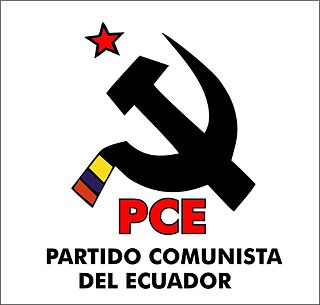 W
WCommunist Party of Ecuador is a political party in Ecuador. It was formed in 1925 as the Socialist Party. The party publishes El Pueblo, the general secretary is Winston Alarcón and the youth wing of the PCE is the Juventud Comunista del Ecuador (JCE).
 W
WThe Communist Party of Finland was a communist political party in Finland. The SKP was a section of Comintern and illegal in Finland until 1944.
 W
WThe Communist Party of Greece is a Marxist–Leninist political party in Greece. Founded in 1918 as the Socialist Labour Party of Greece, it is the oldest political party in modern Greek politics. The party was banned in 1936, but played a significant role in the Greek resistance and the Greek Civil War, and its membership peaked in the mid-1940s. Legalization of the KKE was restored following the fall of the Greek military junta of 1967–1974.
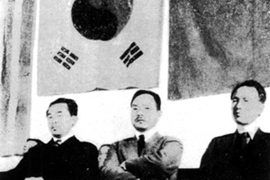 W
WThe Communist Party of Korea was a communist party in Korea. It was founded during a secret meeting in Seoul in 1925. The Governor-General of Korea had banned communist parties under the Peace Preservation Law, so the party had to operate in a clandestine manner. The leaders of the party were Kim Yong-bom and Pak Hon-yong.
 W
WThe Communist Party of Lithuania was a communist party in Lithuania, established in early October 1918. The party was banned in 1991.
 W
WThe Communist Party of Norway is a small Marxist–Leninist communist party in Norway.
 W
WThe People's Vanguard Party, or Popular Vanguard Party is a communist party in Costa Rica. PVP was founded in 1931 as the Workers and Farmers Party, but was soon renamed to the Communist Party of Costa Rica.
 W
WThe Egyptian Socialist Party was a political party in Egypt founded in 1921. The party included both Marxist, Anarchist and Reformist elements. The party platform was published on August 29, 1921. The party began publishing the newspaper ash-Shebiba (الشبيبة). The party established a network of local branches in major cities around the country. It initiated work amongst trade unions and took part in organizing strikes. It also began educational activities for children of workers as well as trying to reach out to mobilize the peasantry.
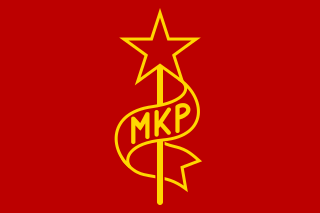 W
WThe Party of Communists in Hungary, renamed Hungarian Communist Party in October 1944, was founded on November 24, 1918, and was in power in Hungary briefly from March to August 1919 under Béla Kun and the Hungarian Soviet Republic. The communist government was overthrown by the Romanian Army and driven underground. The party regained power following World War II and held power from 1945 under the leadership of Mátyás Rákosi. In 1948 the party was merged with the Social Democratic Party of Hungary to become the Hungarian Working People's Party. The Communist Party of Hungary was a member of the Communist International.
 W
WThe International Trade Union Committee of Negro Workers (ITUCNW) was a section of the Profintern active during the late 1920s and 1930s that acted as a radical transnational platform for black workers in Africa and the Atlantic World.
 W
WThe Irish Worker League was an Irish communist party, established in September 1923 by Jim Larkin, following his return to Ireland. Larkin re-established the newspaper The Irish Worker. The Irish Worker League (IWL) superseded the first Communist Party of Ireland and became Ireland's affiliate with the Communist International.
 W
WThe Italian Communist Party was a communist political party in Italy.
 W
WThe Labour Party, formerly the Norwegian Labour Party, is a social-democratic political party in Norway. It was the senior partner of the governing red–green coalition from 2005–2013 and its leader Jens Stoltenberg served as Prime Minister. The party is currently led by Jonas Gahr Støre.
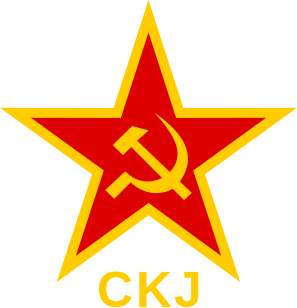 W
WThe League of Communists of Yugoslavia, known until 1952 as the Communist Party of Yugoslavia, was the founding and ruling party of SFR Yugoslavia. It was formed in 1919 as the main communist opposition party in the Kingdom of Serbs, Croats and Slovenes and after its initial successes in the elections, it was proscribed by the royal government and was at times harshly and violently suppressed. It remained an illegal underground group until World War II when, after the Invasion of Yugoslavia in 1941, the military arm of the party, the Yugoslav Partisans, became embroiled in a bloody civil war and defeated the Axis powers and their local auxiliaries. After the liberation from foreign occupation in 1945, the party consolidated its power and established a one-party state, which existed until the 1990 breakup of Yugoslavia.
 W
WThe Malayan Communist Party (MCP), officially known as the Communist Party of Malaya (CPM), was a political party in the Federation of Malaya and Malaysia. It was founded in 1930 and laid down its arms in 1989. It is most known for its role in the Malayan Emergency.
 W
WThe Communist Party of the Netherlands was a Dutch communist party. The party was founded in 1909 as the Social-Democratic Party (SDP) and merged with the Pacifist Socialist Party, the Political Party of Radicals and the Evangelical People's Party in 1991, forming the centre-left GreenLeft. Members opposed to the merger founded the New Communist Party of the Netherlands.
 W
WThe Communist Party of New Zealand (CPNZ) was a Communist political party in New Zealand which existed from March 1921 until the early 1990s. Although spurred to life by events in Soviet Russia in the aftermath of World War I, the party had roots in pre-existing revolutionary socialist and syndicalist organisations, including in particular the independent Wellington Socialist Party, supporters of the Industrial Workers of the World in the Auckland region, and a network of impossiblist study groups of miners on the west coast of the South Island.
 W
WThe Palestine Communist Party was a political party in British Mandate of Palestine formed in 1923 through the merger of the Palestinian Communist Party and the Communist Party of Palestine. In 1924 the party was recognized as the Palestinian section of the Communist International. In its early years, the party was predominantly Jewish.
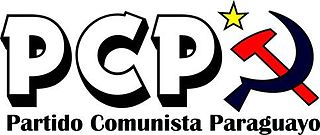 W
WParaguayan Communist Party is a communist political party in Paraguay. PCP was founded on February 19, 1928. Later it was recognized as a section of the Communist International. It was brutally suppressed during the military regimes of the country. It gained legality for a brief period in 1936 and then again in 1946-1947. After the fall of the Alfredo Stroessner regime the party re-emerged as a legal party.
 W
WPeople's Party of Panama is a communist party in Panama. It was founded on 4 April 1930 as the Communist Party of Panama, after Panamian communists broke away from the Labour Party. Early leaders of the PCP included Eliseo Echévez and Cristóbal Segundo. The PCP joined the Communist International and reached its apogee of popularity during and right after World War II. In 1943 the PCP changed its name to the People's Party of Panama.
 W
WThe Peruvian Communist Party is a communist party in Peru. It was founded in 1928 by José Carlos Mariátegui, under the name Partido Socialista del Perú. In 1930 the name was changed to PCP. The party is often identified as PCP [Unidad], to separate it from the Communist Party of Peru – Shining Path.
 W
WThe Romanian Communist Party was a communist party in Romania. Successor to the pro-Bolshevik wing of the Socialist Party of Romania, it gave ideological endorsement to a communist revolution to overthrow the Kingdom of Romania. The PCR was a minor and illegal grouping for much of the interwar period, and submitted to direct Comintern control. During the 1930s, most of its activists were imprisoned or took refuge in the Soviet Union, which led to the creation of separate and competing factions until the 1950s. The Communist Party emerged as a powerful actor on the Romanian political scene in August 1944, when it became involved in the royal coup that toppled the pro-Nazi government of Ion Antonescu. With support from Soviet occupational forces, the PCR was able to force King Michael I into exile, and establish undisguised Communist rule in 1948.
 W
WThe Communist Party of Turkey was a political party in Turkey. The party was founded by Mustafa Suphi in 1920, and was soon to be banned. It worked as a clandestine opposition party throughout the Cold War era, and was persecuted by the various military regimes. Many intellectuals, like Nâzım Hikmet, joined the party ranks. In 1988 the party merged into the United Communist Party of Turkey, in an attempt to gain legal status.
 W
WTuvan People's Revolutionary Party was a political party in Tuva, founded in 1921. When the Tuvan People's Republic was founded in the same year, the party held single-party control over its government as a vanguard party.